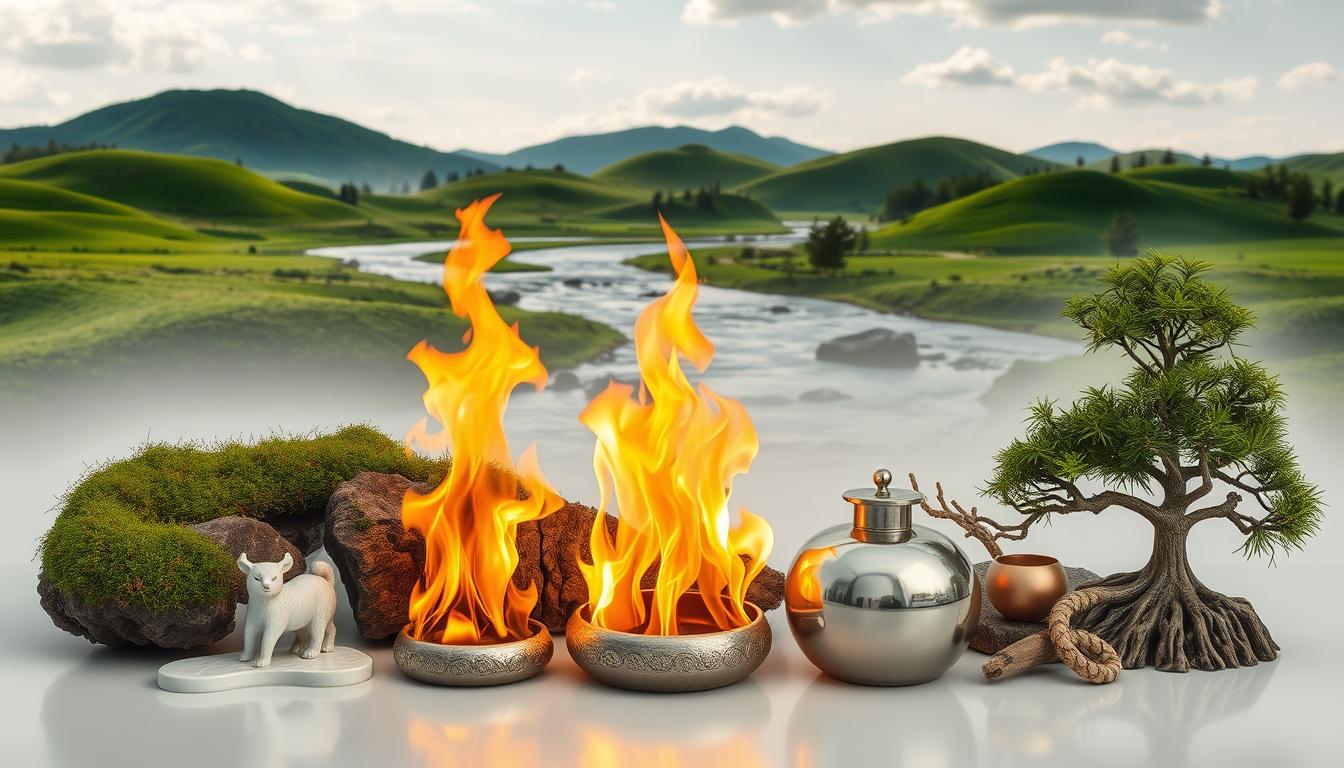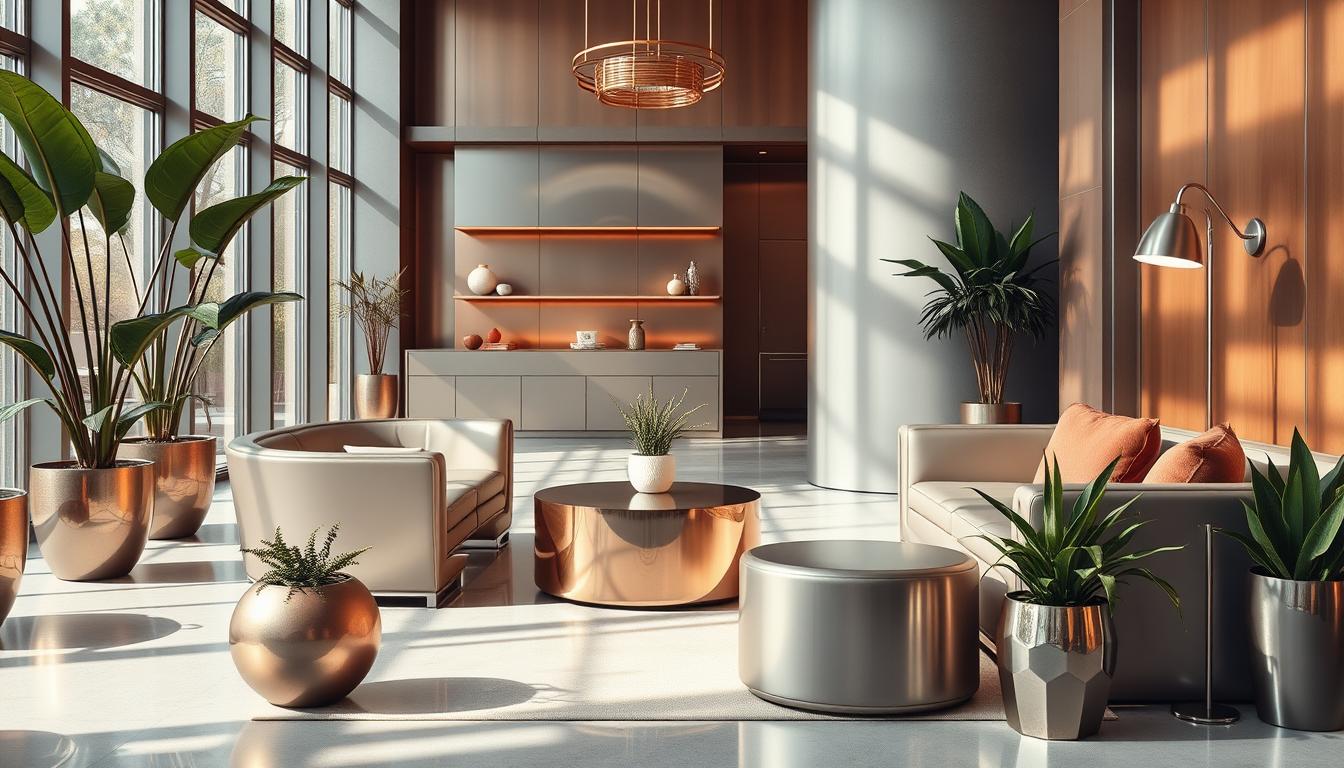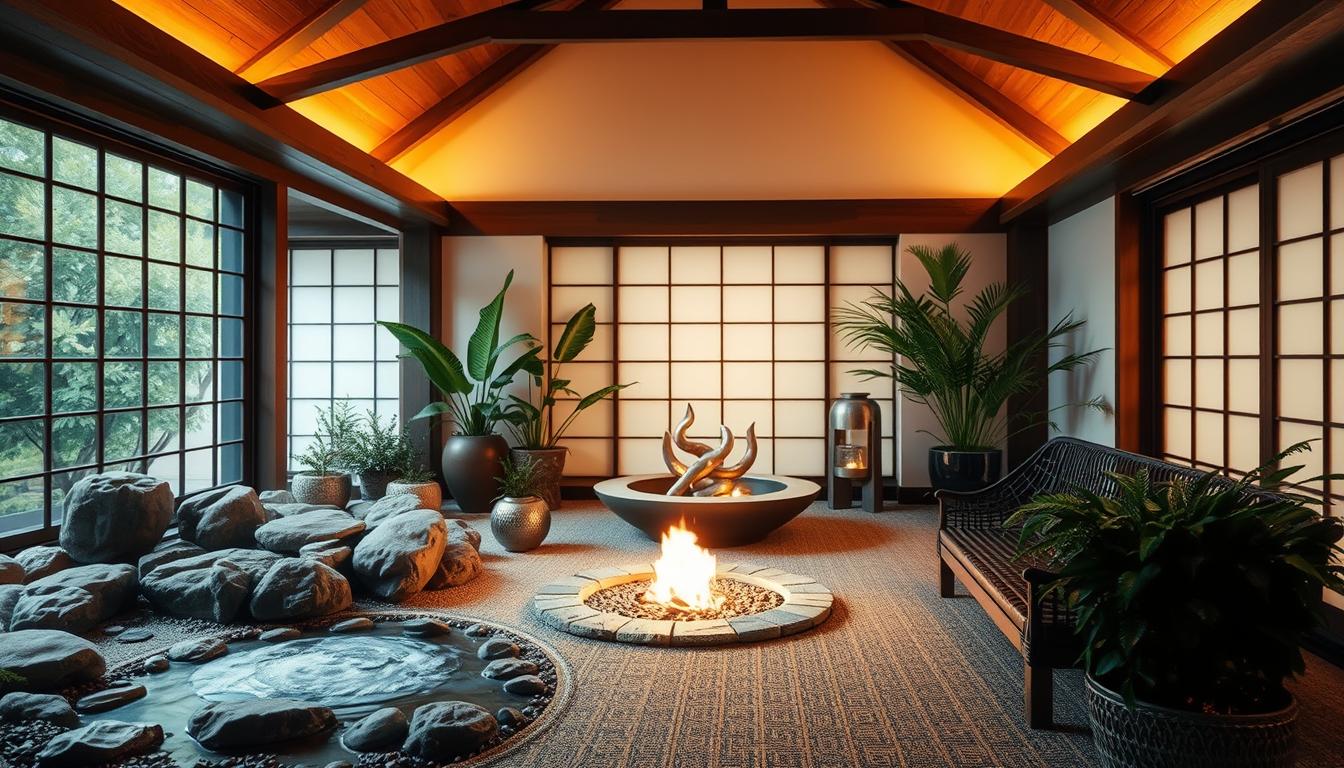Feng Shui is an ancient Chinese philosophy that focuses on arranging Earth, Water, Fire, Metal, and Wood. These elements, known as the feng shui five elements, greatly affect your space’s energy and mood. Each element has its own special qualities and benefits, improving your life when used right.
Learning to balance these elements is key to a beautiful and energy-positive space. This article will show you how to use Earth Water Fire Metal Wood Feng Shui in your home or office.

Key Takeaways
- Feng Shui emphasizes the importance of the five elements: Earth, Water, Fire, Metal, and Wood.
- Each element contributes uniquely to the energy and ambiance of a space.
- Balancing these elements can lead to improved well-being and harmony.
- Practical applications are vital for integrating feng shui five elements into your environment.
- Understanding the characteristics of each element helps in effective implementation.
Understanding Feng Shui Basics
Feng Shui is an ancient Chinese philosophy. It focuses on arranging the environment to improve the flow of energy, called Qi. Learning the basics of feng shui helps create spaces that are balanced and harmonious.
At the heart of this philosophy are yin and yang. These represent the duality in all things. The Bagua map is also key. It’s a tool for analyzing energy in a space.
The Bagua map helps identify areas of life influenced by different energies. It guides on how to improve these areas through design and organization. Knowing about chi, or life force energy, is vital for positive outcomes.
By mastering these basics, one is ready to explore the five elements in feng shui. Each element—Earth, Water, Fire, Metal, and Wood—has unique qualities. They influence the environment in different ways.
Using the five elements in feng shui leads to effective design. It reflects the natural world, improving both looks and emotional well-being. Each element plays a crucial role in achieving harmony in spaces.
The Importance of the Five Elements in Feng Shui
The five elements in Feng Shui—Earth, Water, Fire, Metal, and Wood—are key to creating peaceful homes. They help improve our well-being and make our surroundings calm. Each element is linked to different parts of life, nature, and feelings.
Earth stands for stability and nourishment. It helps us feel grounded and supported, which is vital for emotional health. Water, on the other hand, brings flow and adaptability. It helps us communicate better and stay calm, which is good for our relationships.
Fire is all about energy and passion. It brings motivation and creativity to a space. Adding fire elements can make a place lively and inspiring. Metal is about clarity and precision. It helps us focus and stay organized, boosting our mental sharpness.
Wood is all about growth and vitality. It encourages renewal and expansion, which is key for personal growth. The five elements work together in Feng Shui. They affect our health, relationships, and overall happiness.
| Element | Associated Aspect | Impact on Life |
|---|---|---|
| Earth | Stability | Emotional grounding and support |
| Water | Flow | Improved communication and calmness |
| Fire | Energy | Increased motivation and creativity |
| Metal | Clarity | Enhanced focus and productivity |
| Wood | Growth | Promotes renewal and development |
Earth: Stability and Nourishment in Your Space
The Earth element in feng shui brings stability and nourishment. It makes your space feel balanced and safe. Choosing the right colors and materials is key to creating a grounded atmosphere. This section will guide you on making those choices.
Color and Material Choices for Earth
Colors and materials are crucial for harmony in your space. Use browns, yellows, and terracotta to connect with the Earth. These colors fit well with many design styles.
For materials, think about ceramics, stones, and clay. These can be used in furniture or decor to add an earthy feel.
How to Incorporate Earth Elements
To add Earth elements to your space, decorate thoughtfully. Here are some tips:
- Use planters to bring in greenery and life.
- Choose artwork that shows calm landscapes or organic themes.
- Add natural textures with fabrics like jute or burlap.
By following these tips, you can create a nurturing space. It will feel more stable and peaceful, thanks to the Earth element.
Water: Flow and Purity in Feng Shui
The Water element in Feng Shui stands for flow, purity, and calm. Using water features can make a space peaceful and full of positive energy. Features like fountains, aquariums, or ponds add to the calming effect of water.
Enhancing Serenity with Water Features
Adding water features to a space can greatly improve its feel. The sound of water is soothing, helping to block out noise and lower stress. Here are some ways to bring serenity:
- Tabletop or wall-mounted fountains
- Indoor aquariums filled with colorful fish
- Small ponds with aquatic plants
- Water bowls with floating candles or flowers
Water’s Impact on Mood and Atmosphere
Water deeply affects our mood and the atmosphere around us. Its gentle sounds and reflections bring peace and joy. Water also makes rooms feel bigger and brighter. Knowing this, we can use water’s power to our advantage:
| Water Feature Type | Mood Effect | Best Placement |
|---|---|---|
| Fountain | Calm and Inviting | Near the entrance or living area |
| Aquarium | Relaxing and Joyful | In a family room or study |
| Pond | Peaceful and Natural | Outdoor spaces or gardens |
| Water Bowls | Soothing and Elegant | On coffee tables or window sills |
Fire: Energy and Passion in Your Environment
The Fire element is key in feng shui, representing energy, passion, and change. It can make a space lively, but it’s important to keep it balanced. There are ways to use fire energy in feng shui to make your space better, not worse.
Techniques for Balancing Fire Energy
To get the right balance of fire energy in feng shui, try these:
- Candles: Place candles carefully to add warmth and life to your space.
- Lighting: Use lights that you can adjust to control how much fire energy you have.
- Color Placement: Add colors like red, orange, and yellow to bring excitement and warmth, but not too much.
- Fire Elements: Use things like mirrors or shiny objects to reflect fire light and boost the energy safely.
Color Schemes that Reflect Fire Elements
Using fire colors in your space can make it more lively and uplifting. Here are some color schemes to bring in fire’s spirit:
| Color | Effect | Suggested Areas |
|---|---|---|
| Red | Boosts energy and excitement | Living rooms, dining areas |
| Orange | Promotes enthusiasm and creativity | Home offices, creative spaces |
| Yellow | Enhances happiness and optimism | Kitchen, cheerful spaces |
By making smart design choices and placing fire elements thoughtfully, you can create a space that feels balanced and supports the good aspects of fire energy in feng shui.
Metal: Clarity and Precision in Design
The metal elements in feng shui bring clarity and precision. They add structure and order to any space. Using metallic colors like white, gray, and gold can greatly improve your space. These colors make your environment look better and feel more uplifting.
Using metal for furniture, sculptures, and decorations creates a neat and organized area. This is especially good for places where you need to focus, like home offices or study areas. Placing metal objects in the right spots helps create a space that boosts productivity.
Here are some main benefits of adding metal elements to your design:
- Promotes a sense of organization
- Enhances clarity in thoughts and decisions
- Encourages a structured environment for work
Adding these elements not only makes your space look better. It also follows feng shui principles, creating a balanced and harmonious environment.

Wood: Growth and Vitality in Your Space
The Wood element is all about growth, vitality, and creativity. Adding wood elements in feng shui makes spaces feel fresh and inspiring. Natural wood decor makes your home look great and feel welcoming. Here are some tips to bring these ideas into your home.
Incorporating Wood Through Decor
Wooden decor can change a space’s energy. Here are some ideas:
- Wooden furniture like tables and chairs adds a rustic yet elegant feel.
- Wooden shelves are useful and can hold plants or books.
- Art made from reclaimed wood boosts creativity and connects us to nature.
Embracing the Natural Essence of Wood
To really connect with wood, focus on natural textures and shapes. You can do this by:
- Picking decor items with organic shapes that remind us of nature.
- Using colors that go well with wood, like greens and earthy tones.
- Adding plants and greenery to refresh the space and keep energy flowing.
Adding wood elements in feng shui makes your space beautiful. It also creates a place full of positive energy and creativity.
Feng Shui Five Elements: Earth Water Fire Metal Wood Feng Shui
Balancing the five elements in feng shui is key to creating harmony in spaces. Each element—Earth, Water, Fire, Metal, and Wood—has its own special qualities. These qualities affect the energy in a room. Knowing how to balance these elements can greatly improve a room’s feel and function.
Creating Balance Among All Five Elements
To find balance, start by checking how each element is represented in your space. Look for any signs of too much or too little of certain elements. A room with too much of one element might feel off or too much.
For instance, too much Earth can make a space feel too stable and dull. A balanced space, on the other hand, has a mix of all elements. This mix creates a lively and welcoming atmosphere.
Practical Tips for Element Integration
Adding the five elements can change a room’s energy. Here are some easy tips:
- Earth: Use earthy colors like browns and yellows in your decor.
- Water: Add water features like fountains or aquariums for calm.
- Fire: Use candles or bright red items to boost energy.
- Metal: Include metallic items, like frames or sculptures.
- Wood: Add plants or wooden furniture to encourage growth.
By carefully arranging your space, you can achieve a good balance. Think about which elements are missing and add them in a thoughtful way. This will improve the energy flow in your space.

Practical Applications of Feng Shui
Using feng shui in daily life can boost energy and well-being. It’s about making thoughtful changes to your surroundings. Knowing how to check your space for feng shui makes your adjustments more effective.
Assessing Your Space
Start by looking at the places you spend most of your time. Find out what might be blocking harmony or energy. Think about these points when you check your space:
- Room layout: Is furniture set up to encourage movement and interaction?
- Natural light: Does the room get enough sunlight? If not, find ways to brighten it up.
- Clutter: Spot any clutter or items that don’t serve a purpose anymore.
Making Changes for Positive Energy Flow
After assessing, make changes to improve the atmosphere. Focus on these:
- Decluttering: Get rid of things you don’t need to open up space.
- Rearranging furniture: Make sure paths are clear and furniture supports socializing.
- Adjusting color schemes: Use colors that match the elements you want to boost, fitting the space’s energy.
Common Misconceptions about Feng Shui
Feng Shui is more than just superstition. It’s a philosophy that helps people from all backgrounds create better spaces. It’s not just for Asian cultures.
Many think feng shui means big changes or expensive things. But, small tweaks can make a big difference. You don’t need to overhaul your space to improve it.
Some believe feng shui is only about looks. But it’s also about making spaces better for our health and happiness. It’s a practical way to improve our daily lives.
By clearing up these myths, we can see how feng shui really works. It can change our homes and our lives for the better. It’s time to understand its true power.
| Misconception | Clarification |
|---|---|
| Feng Shui is only for Asian cultures | Applicable to all cultures for design and harmony |
| Only expensive renovations can create positive energy | Small changes can drastically improve energy flow |
| Feng Shui is just about aesthetics | It addresses emotional and physical well-being too |
| All or nothing approach is necessary | Simple adjustments can yield significant benefits |
Conclusion
We’ve looked at how Earth, Water, Fire, Metal, and Wood shape our homes. Each element has its own role, affecting our space’s energy and feel. Knowing how they work together helps us make spaces that are not just pretty but also good for our well-being.
To bring feng shui into your home, think carefully about what you need. Start small and see how these elements fit into your life. Even small changes can make a big difference, helping you create a space full of positive energy.
Start using these ideas to make your space better. Every choice you make, from design to where you put things, adds to your personal haven. By using what you’ve learned, you can make a place where peace and energy flow freely.
FAQ
What are the five elements in Feng Shui?
In Feng Shui, the five elements are Earth, Water, Fire, Metal, and Wood. Each one has its own energy and affects different parts of life and health.
How do the five elements in Feng Shui interact with each other?
The elements work together in special ways. For example, Wood feeds Fire, and Fire makes Earth. Earth holds Water, Water makes Metal, and Metal can cut Wood. Knowing these relationships helps keep a space balanced.
Why is balance among the five elements important in Feng Shui?
Balance is key because it lets Qi (energy) flow smoothly in your space. Without it, you might feel off emotionally, physically, or in your relationships.
How can I incorporate Earth elements into my home?
Use Earth elements like browns and yellows, and materials like ceramics and stone. Adding planters, earthy art, and textured fabrics also brings in Earth’s grounding energy.
What are effective water features for promoting tranquility?
Good water features are fountains, aquariums, and ponds. They make your space calm, with soothing sounds and sights that help you relax.
How can I balance Fire energy in my environment?
Balance Fire with candles, orange and red decor, and the right lighting. Make sure Fire isn’t too strong to avoid overwhelming your space, but still energize it.
What role does the Metal element play in Feng Shui?
Metal stands for clarity, precision, and structure. Adding metallic colors and materials, like silver and gold, improves focus and organization in areas like offices or studies.
How can I bring Wood elements into my decor?
Add Wood with wooden furniture, plants, and natural art. Organic textures and forms boost Wood energy, bringing inspiration and energy.
What are some practical tips for balancing all five elements in my space?
Check if each element is present in your space. Use colors and materials that complement each other to achieve harmony. For example, add a water feature or blue tones if Water is missing.
Are there common misconceptions about Feng Shui that I should know?
Yes, people often think Feng Shui is just superstition or for certain cultures. But it’s a real way to design spaces that meet your desires and improve your well-being.










